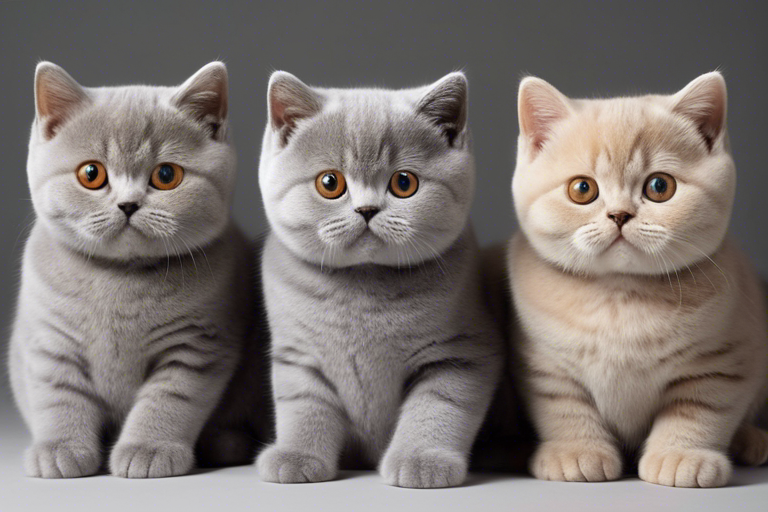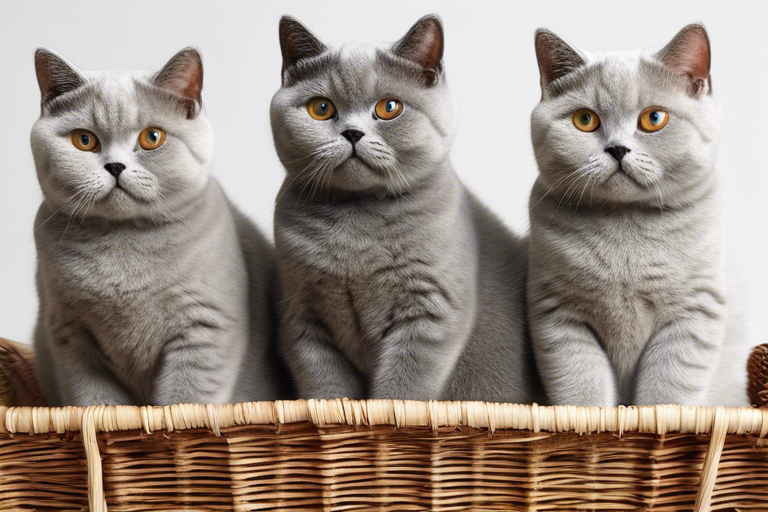## Introduction
Are you considering adding a British Shorthair cat to your family? These adorable felines are known for their permanent smile and classic blue-grey coat. But before you bring one home, it’s important to understand the pros and cons of owning this charming breed. In this comprehensive guide, we’ll explore the health, intelligence, lifespan, general care, personality, and other important aspects of British Shorthair cats. By the end, you’ll have a clear understanding of whether this breed is the right fit for you.
Health Considerations
Like any pet, British Shorthair cats have certain health considerations that prospective owners should be aware of. While they are generally healthy cats, there are a few genetic and hereditary diseases that can affect them. One such condition is hypertrophic cardiomyopathy, a heart problem that can compromise blood circulation. British Shorthairs are also prone to urinary stones, which can block the passage of urine. Another concern is hemophilia B, a blood clotting disorder that can cause bleeding. While these conditions are not common, it’s important to be aware of them and provide proper care for your cat.
Intelligence and Personality
British Shorthair cats are known for their intelligence and observant nature. While they may appear calm and reserved, they are actually quite intelligent and can benefit from mental stimulation. It’s important to challenge their minds with toys and games to keep them entertained and engaged. Despite their intelligence, British Shorthairs are known to mature slowly, maintaining their youthful spirit throughout their lives. They are also very attached to their human parents and enjoy being close to them. While they may not be vocal or agitated, they still love to play and appreciate attention from their owners.
Lifespan and Care
The average lifespan of a British Shorthair cat is around 13 years. While this may not be as long as some other cat breeds, with proper care and attention, they can exceed this expectancy. It’s important to provide them with quality food and a balanced diet to ensure their overall health and well-being. Wet foods are recommended to increase their water intake and prevent urinary problems. Additionally, regular brushing is necessary to keep their coat looking good and to prevent the accumulation of dead hairs.
General Caretaking
One of the advantages of owning a British Shorthair cat is that they are not fussy and do not require excessive care. They are known to be well-behaved and are less likely to scratch furniture or belongings. However, it’s important to provide them with physical exercise to prevent obesity and keep them in good shape. Interactive toys and games can help stimulate their minds and keep them entertained. Additionally, dental care is important for cats, including British Shorthairs, to prevent the formation of bacterial plaque and periodontal disease.
Pros of British Shorthair Cats
1. Loving and Affectionate
British Shorthair cats are known for their loving and affectionate nature. Unlike some cat breeds, they enjoy being close to their human parents and will often follow them from room to room. They are social butterflies and will greet their owners enthusiastically when they come home. Their attachment to their owners makes them wonderful companions and great for households with individuals who crave affection and attention.
2. Great Indoor Cats
If you prefer to keep your cat indoors, the British Shorthair is an ideal choice. They are less inclined to wander and are generally content with short bursts of exercise followed by long periods of rest. This makes them well-suited for apartment living or households without access to outdoor spaces. By keeping them indoors, you can ensure their safety, health, and longevity.
3. Low Maintenance
Compared to some other cat breeds, British Shorthairs are relatively low-maintenance. They do not require extensive grooming and only need weekly or bi-weekly brushing sessions. While they may shed heavily during certain seasons, regular brushing can help minimize the mess. Additionally, their short or medium-length coat is easy to care for and does not tangle easily.
4. Compatibility with Children and Other Pets
British Shorthairs are generally great with children and other pets. With proper socialization, they can get along well with dogs and other cats. They have a calm and gentle nature, making them suitable companions for families with young children. Their tolerance and adaptability make them an excellent choice for multi-pet households.
5. Beautiful and Unique Appearance
One of the standout features of British Shorthair cats is their stunning appearance. With their classic blue-grey coat and mesmerizing almond-shaped eyes, they are a joy to look at. Their unique and charming appearance is sure to capture the hearts of any cat lover. Whether you’re looking for a cat with striking blue eyes or a more rare color variation, the British Shorthair has something for everyone.

Cons of British Shorthair Cats
1. Shedding
British Shorthairs do shed quite a bit, especially during spring and fall. This can result in a significant amount of fur around the house and potential hairball problems for the cat. Regular brushing can help manage the shedding, but it’s important to be prepared for the extra cleaning and maintenance that comes with owning a cat that sheds.
2. Allergies
If you or someone in your household is allergic to cats, the British Shorthair may not be the best choice. While they are not considered hypoallergenic, there are ways to minimize allergies, such as daily vacuuming, regular brushing, and taking antihistamines. However, it’s important to note that these measures may not completely eliminate allergies for individuals who are highly sensitive.
3. Potential Health Issues
While British Shorthairs are generally healthy cats, there are some health issues that may arise. Gum disease is a common problem, especially if they consume wet or canned food. Regular dental care, such as brushing their teeth and feeding them dry cat food, can help prevent dental issues. Additionally, they may be prone to hyperthyroidism, arthritis, heart and kidney diseases, and feline lower urinary tract disease. Regular veterinary check-ups and proper care can help catch and address these issues early on.
4. Vocalization
Some British Shorthairs can be quite vocal, meowing for attention or expressing their displeasure. While this may not be an issue for some owners, it can be bothersome for others, especially if the meowing becomes excessive. Understanding and meeting their needs, providing attention and affection, and ensuring they have a stimulating environment can help minimize excessive vocalization.
Conclusion
Owning a British Shorthair cat can be a rewarding experience, but it’s important to weigh the pros and cons before making a decision. These cats are loving, low-maintenance, and great companions for families with children and other pets. However, they do require regular grooming, shed quite a bit, and may have certain health issues. By understanding the unique characteristics and needs of British Shorthair cats, you can make an informed decision and provide the best care for your furry friend. Whether you decide to adopt or buy a British Shorthair, they are sure to bring joy and charm to your home.

2 thoughts on “British Shorthair Cats: The Pros and Cons of Owning this Charming Breed”